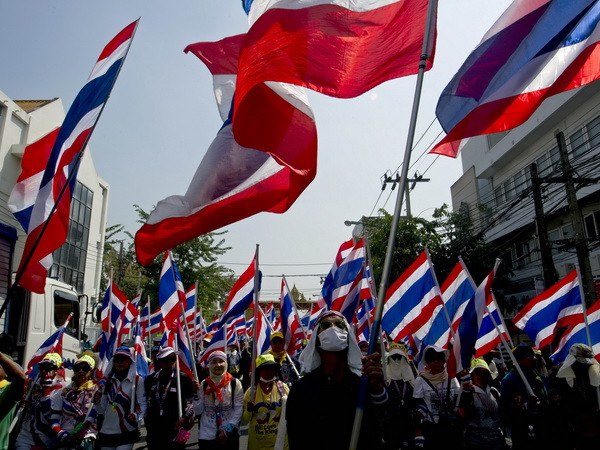Thai government agrees to postpone February 2 election
On January 25, the anti-government protest movement again marched on the streets of Bangkok to call on people to support reforms before the election.
The march, led by protest leader Suthep Thaugsuban, aimed to explain to the people the need for reform in Thailand.
 |
| Anti-government protesters march in Bangkok on January 24. (Source: AFP/VNA) |
| RELATED NEWS |
|---|
Protesters say they will not disrupt or oppose voters going to the polls in early voting, but will launch a campaign for reforms before the election.
Protesters not only demand the postponement of the upcoming February 2 election, but also want Prime Minister Yingluck Shinawatra to resign.
Thai police have deployed additional forces at polling stations to ensure security for the January 26 vote as there is still a possibility of violence.
The Thai government has signaled it is willing to postpone the election following the Constitutional Court ruling, but it has set conditions that protesters must disperse and pledge not to boycott the new polls.
The government's postponement of the election is meaningless if the protest movement continues to take action.
Thailand's Election Commission is expected to invite Ms Yingluck to a meeting to discuss ways to postpone the election.
According to the government's Election Commission, it may seek a new royal decree to set a new election date and cancel the old one.
A new election date is likely to be no more than three months after the postponement is agreed upon. However, early voting tomorrow should still go ahead as planned.
The Constitutional Court's ruling to postpone the election is seen as a move to defuse the possibility of conflict as both the government and protesters have shown determination to pursue their own goals.
The Thai government explained that neither it nor the Election Commission has the right to postpone the election because the current constitution does not give them that right. However, the intervention of the Constitutional Court will create a legal basis for the government and the Election Commission to discuss this matter.
Thai media reported that former Prime Minister Thaksin Shinawatra was aware of the court's ruling and may agree to postpone the election if it leads to violent conflict because of protesters' threats to disrupt voting.
If the Thai government agrees with the Election Commission to postpone the February 2 election, the pressure they are facing will shift to the protesters, of whom Mr. Suthep is the commander.
Pheu Thai Party Chairman Charupong Ruangsuwan said the current constitution can postpone a snap election for 45 to 60 days, so the new vote will be held no later than May 6.
Meanwhile, the Election Commission is expected to postpone for up to six months to allow for careful preparations./.
According to VNA






